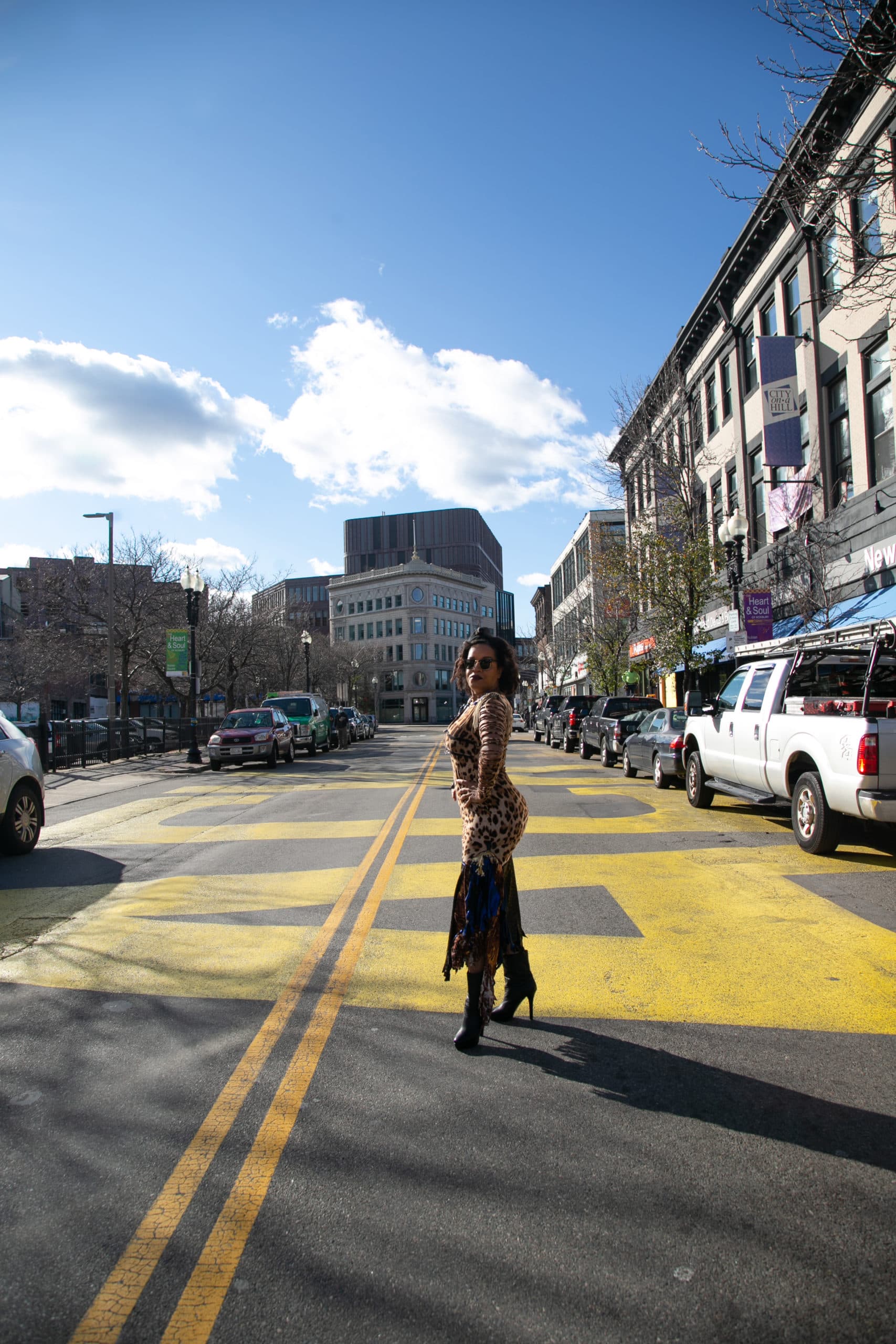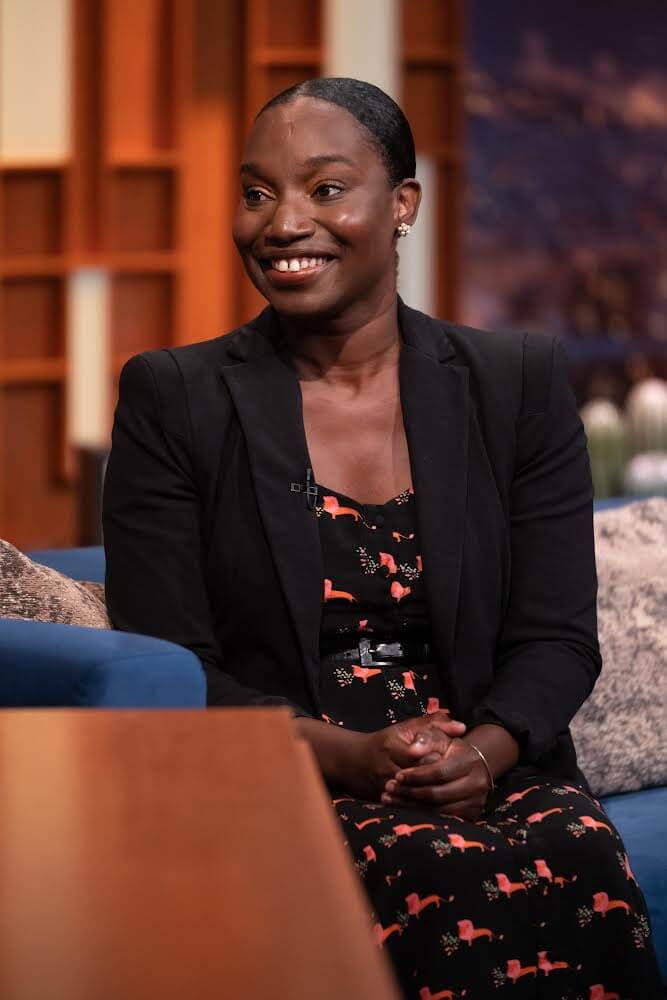Kaidi Grant’s love for Roxbury’s Nubian Square runs deep. Lovingly known as “Kai the Conqueror” by her community, she is the founder and chief curator at Black Market, a community space dedicated to supporting Black businesses and Roxbury’s creative economy. Since it opened its doors in 2017, the market has hosted over 300 vendors through pop-up markets, Pan-African-centric events, and community festivals. Frustrated by the lack of support her community received from the city, Grant and her husband Chris took matters into their own hands. They invested their own capital into Roxbury, creating a space that empowers their community by affirming Black entrepreneurship. Black Market creates a vibrant and safe space for Black creatives and entrepreneurs to thrive and build generational wealth.
Yet beyond Black Market, Grant is a multi-hyphenate civic leader who champions the creation and preservation of Black spaces in Roxbury and throughout Boston. During the last meeting of 2020, the Boston Planning & Development Agency approved the development of a two-acre site between Washington Street and Harrison Avenue to Nubian Square Ascends—a project put forth by Boston developer Richard Taylor and Almiranta Capital with Kai and Chris Grant. The building will be a site for small businesses, marketplaces, and artist work spaces with a goal of bringing economic and cultural vitality back to Nubian Square, especially for the BIPOC community members that call it home. Black Market will be a central hub in the new development with Kai and Chris Grant curating several aspects of the community partnerships.
Grant’s family lineage spans from Roxbury to Guyana and North Carolina, but her family has lived in Roxbury for over 100 years. Her footsteps are ordered with a self-awareness of her history, her activism, her Blackness, her spirituality, and her roots in education. She is bridging the gap within the African diaspora. Grant and I had a very honest conversation about the future of Roxbury, generational wealth, and how to revel in our Blackness in spite of the racial climate in the United States. The following is an edited transcript of our conversation.
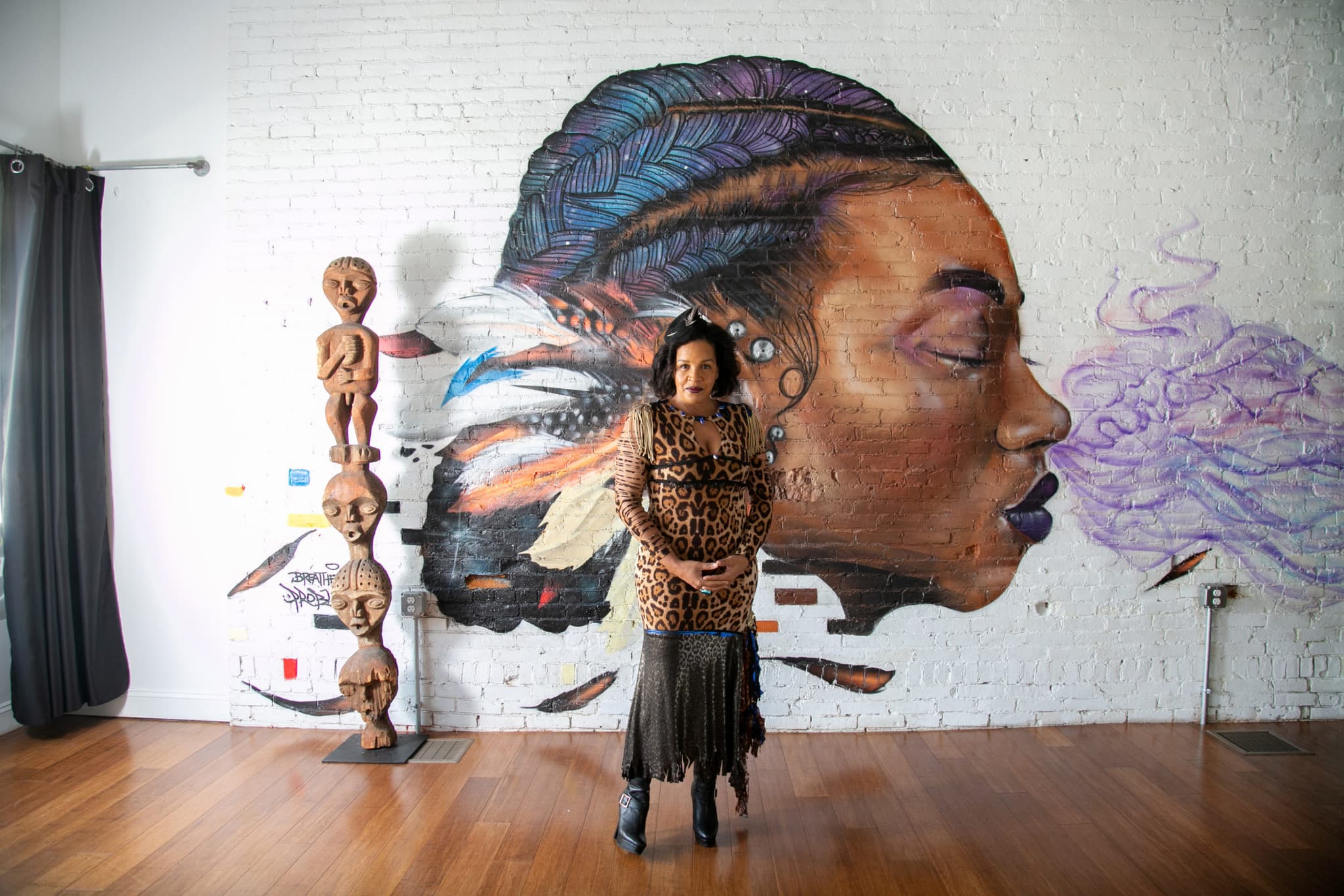
Portrait of Kai Grant in front of Rob “ProBlak” Gibbs’s Breathe Life X (2017) inside Black Market. Image by Cassandra Rodriguez.
Margo Gabriel: What does Roxbury mean to you?
Kai Grant: That’s a pretty deep question. Roxbury is the soil from which I was grown; Roxbury is the lifeblood of my formative years; Roxbury is the place where we found sanctuary from the hate of white supremacy. It’s where my parents conceived me in the projects of Codman Park and where they helped found the new School for Children to shield me from racist curriculum.
Roxbury is where we hung Down Dudley. We traveled through Dudley and fought Down Dudley to and from Latin School. We declared ourselves Nubians in honor of our African culture driven by the Abdal-Khallaq family [owner of the now closed shop, A Nubian Notion].
Roxbury is the home of great artists: Donna Summer, Natalie Cole, New Edition, Dana Chandler, Topper Carew, Guru, Ed O.G., Susan Batson, Elma Lewis, Ekua Holmes, Paul Goodnight, and many more.
Roxbury is a launchpad for the city’s greatest abolitionists and thought leaders: Malcolm X, Coretta Scott King and Dr. Martin Luther King Jr, Dr. Clifford B. Janey, Louis Farrakhan, Frederick Douglass, Chuck Turner, Harriet Tubman, and Sojourner Truth, among others.
Roxbury is the center of culture for the city and a space for Black Boston. We are proud of a new cultural heritage coming with this next chapter for Black Market and Nubian Ascends in what was the blighted Blair Lot. It is my home and my base from which I derive my dynamic energy. I will always love Roxbury.
MG: Why is it important to preserve Black representation in Boston?
KG: We need to see Black faces in the Black community. We need to be able to say it loud, “I’m Black and I’m proud.” That needs to show forth in all of our art initiatives. We need to fight the gentrification of art and culture.
There’s a lot of gatekeeping. And unfortunately, a lot of our elders have had to do it and have left that legacy of trying to be multicultural versus just being who we are, which is a diverse people all in itself. We should be unashamed of our Blackness and how that interfaces with city government, because for the longest time white folks have tried to erase the narrative of race and act as though race doesn’t matter, but at the same time be extremely racist. And Black people have had to try to fit in in the city because they won’t get paid if they don’t. I think that we’re setting a different precedent. The challenges that we’re seeing in the greater Black community across the diaspora is giving them the courage. And this newer generation is also reigniting that courage for the elders and reminding them of their greatness and the fight that they had, which laid the foundation for this new reformation.
MG: Our theme for this issue of Boston Art Review is Timestamp. You have these key moments of time in your journey as an entrepreneur, as an activist, as an educator, as a cultural steward, mother, and wife. What does timing mean to you?
KG: Timing is everything. We believe Black Market was established just in time for the new revolution that is occurring and happening all around the globe. We have become the backdrop for protests. The protest on Saturday, September 26, was actually rerouted to go right by the murals of Coretta and Martin Luther King outside Black Market, to be in lockstep with the human and civil rights movement of the 1960s. We’re intentional around envisioning our community and being able to tie resources to be able to really make a difference. There’s no other space that’s doing that.
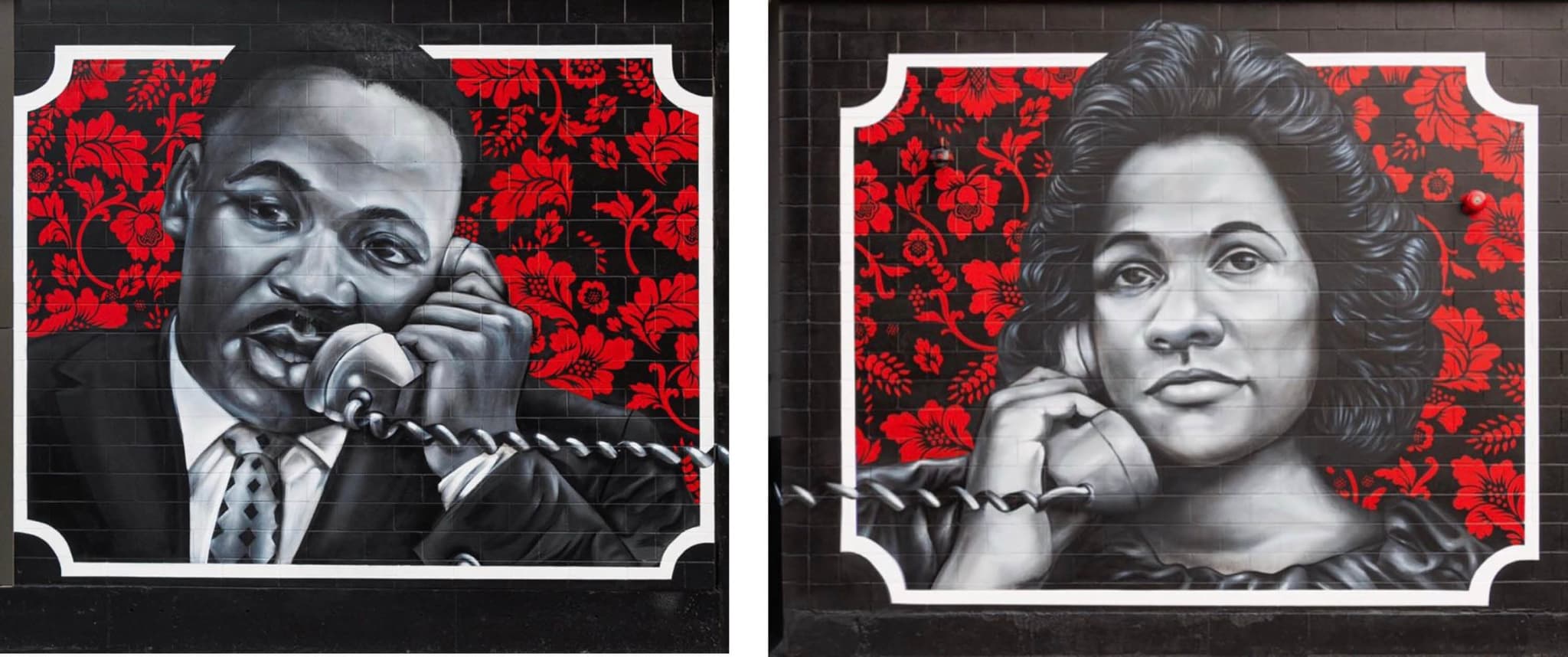
Rob “ProBlak” Gibbs’s Roxbury Love Story (2020) depicts Martin Luther King Jr. and Coretta Scott King on a new building near Nubian Square where the Twelfth Baptist Church where King served as an assistant minister from 1951 to 1954 formerly stood. Photos by Geo Ortega.
MG: Has there been any local government support to Black Market during the pandemic?
KG: Yes, the city has had some grants that they put out that are nominal. But with our Black Lives Matter street mural, we had to get permission and the city was, surprisingly, open to it. I thought that I was gearing up for a fight. I went in with my imaginary boxing gloves. I was very clear with them that this needs to happen for and by Black people. They were very open. They gave us financial support, and we paid about fifteen to twenty artists, most of whom weren’t looking for payment. They got a nice little surprise. Black artists need to be paid. We did it. We got that support from the city. There’s much more that needs to happen within Nubian Square in terms of art and support. I am challenging folks to put some real resources inside of our community. We need to be able to work, live, play, create, and sell right here.
MG: How has Black Market pivoted during the pandemic?
KG: We had to temporarily shut down. Now, we are trying to do a hybrid model with online and a very carefully designed marketplace for safe shopping.
MG: How are the businesses that participated at the Market in the past maintaining during these difficult times?
KG: Most of them have pivoted to online sales. Everybody is struggling for the most part. Some of them have focused on personal protective equipment, which is very much on trend with COVID. Some of us are growing and reinventing ourselves for 2021. In the meantime, we are trying to maintain and hold space for emerging businesses, artisans, and artists. We are trying to equip people with art as a weapon of healing and art as a weapon of fighting. We believe art is a double-edged sword. It’s a good double-edged sword, and we need it. Black art is what got me through when we were all on lockdown.
MG: You said that you were able to revel in your Blackness as a child. That made me think of Nina Simone and her work and activism. She wanted to make Black children curious about where they were from and help them find their place in the world. Do you think it is important to help set the example for Black and Brown youth to develop a sense of pride in who they are and where they are from?
KG: Yes, you’re right on target. Each time during our holiday season, we would bring King T’Challa from Black Panther to Black Market. There was a child that came in last year to see King T’Challa; he literally cried when King T’Challa wasn’t there this year. King T’Challa believes in Roxbury being an offshoot of Wakanda. These are the narratives we create with the kids. It’s wonderful to see families vending with us; kids are there helping set up, break down, selling products, they are meeting people, they are seeing each other. It is one of those spaces you can see yourself in. It is critical that spaces like Black Market are supported. It is not easy in Boston because a lot of people have not learned to embrace Black thought. We demand resources for our community. I am honored to be in this position and do my share in sparking conversation, in sparking controversy and sparking things that are critical and move discussions forward and to challenge ourselves. We can’t sit here and be happy with the state of Black Boston right now. We are losing a lot of our Black Boston talent.
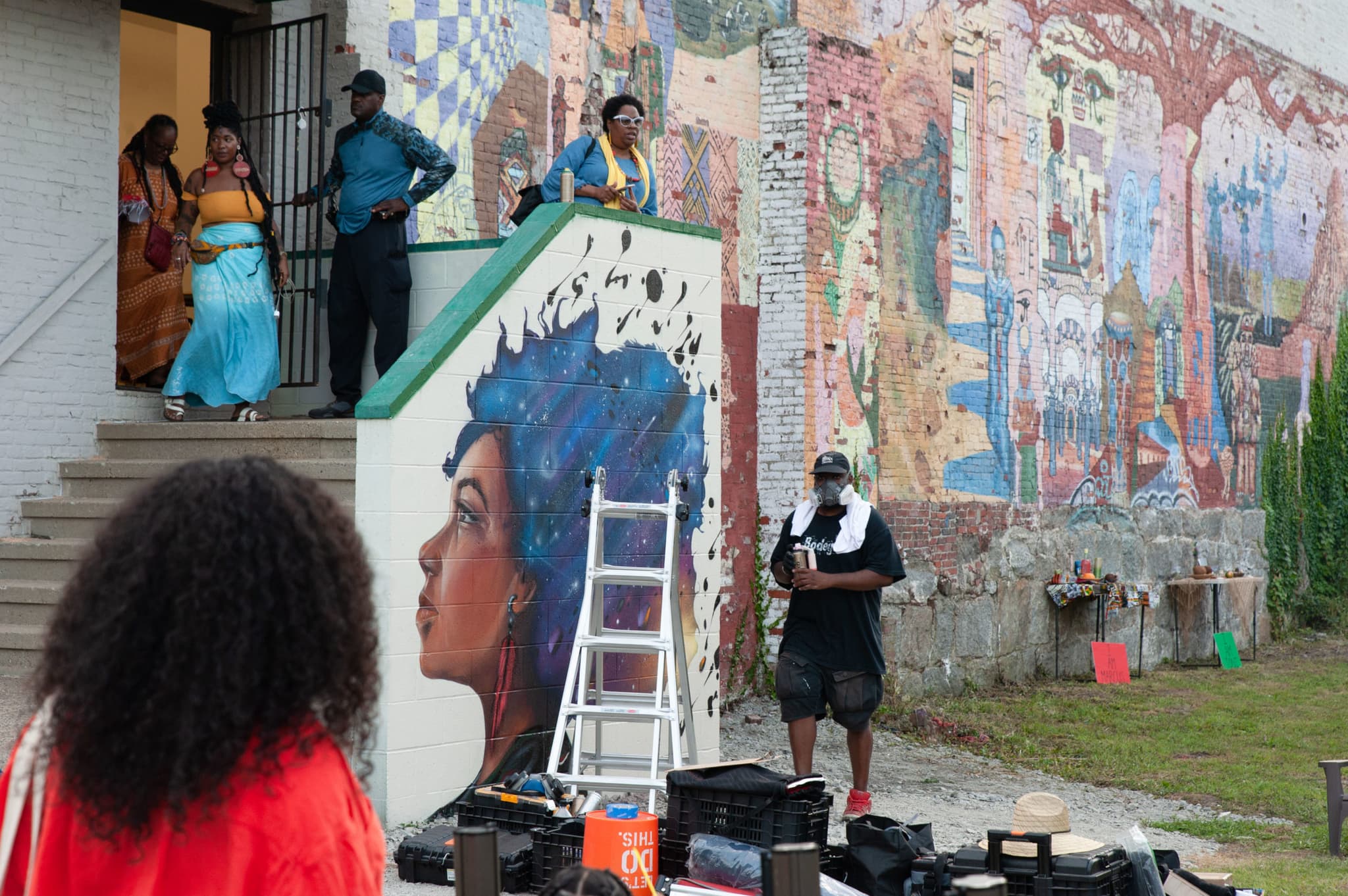
Rob “ProBlak” Gibbs working on a mural during the Afro-Indigenous Arts + Healing Festival at Black Market, August 2019. Image courtesy of Black Market.
MG: What has been your proudest moment since launching Black Market?
KG: My proudest moment is winning a bid on a proposal we submitted to the City of Boston. One of my mentors is a real estate developer named Richard Taylor; he owns Nubian Gallery next door to Black Market. We put together the dopest, Blackest proposal the City of Boston probably has ever seen. We worked on it for over a year, we got positive feedback, and then the other team withdrew their proposal because we had such a strong vision. I was honored to represent Roxbury and my community, because it’s personal and a labor of love.
MG: Congratulations! Plans for growth make me think of legacy and the future. What legacy do you envision for yourself and Black Market?
KG: Legacy is a serious thing. I feel privileged to have had the opportunity to revel in my Blackness and to understand Blackness from a standpoint of strength so that when trauma came in, when racism came in, it wasn’t able to shake my foundation. I think the legacy of Afro-centered living is what I want to leave to this world. We can live our lives from an Afrocentric standpoint, and we can affect and influence the world because we have provided life for the rest of humanity. Life began on the continent. Africa is the beginning, the middle, and the end. And even though it has been raped and divided up, you know, like it was in 1884 at the Berlin Conference [when the United States and European countries met to establish international guidelines for the colonization of Africa], but we are still strong people. I want people to feel proud because they understand they come from greatness. They come from the beginning of civilization, keyword “civil.” Education is a big part of this. If Harriet Tubman can do 60,000 miles on foot, nineteen trips from Maryland to Canada, not losing one person… she built a network, before Facebook, that was a bonafide network of abolitionists, white and Black and everything in between. If you could understand our greatness, I’m telling you…
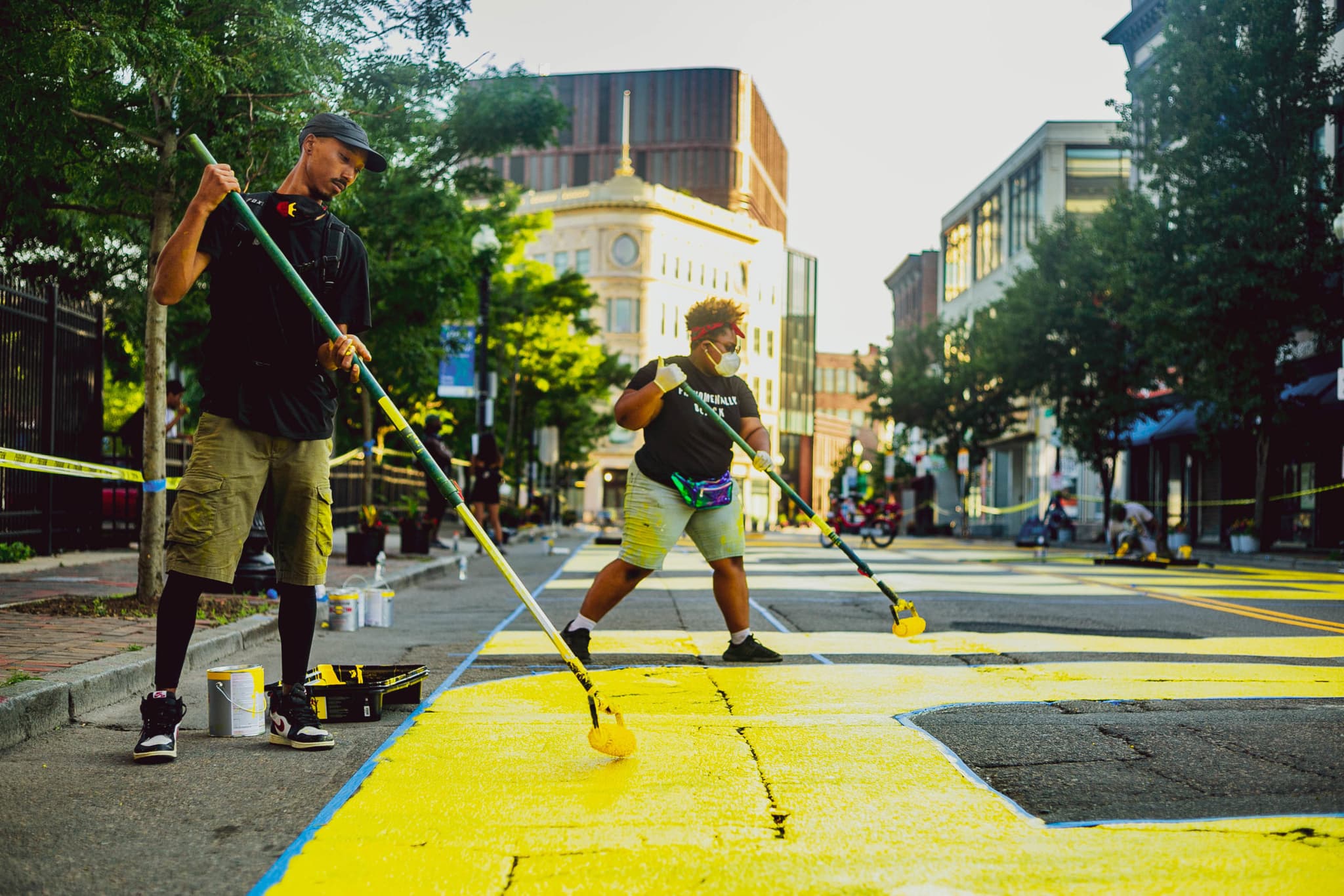
Artists Paul “Mars” Chapman and Chanel Thervil painting the Black Lives Matter mural onto Washington Street between Eustis Street and Palmer Street in Nubian Square on July 5, 2020. Photo by Lauren Miller.
MG: What motivates you as a cultural steward, as an activist, as a Black woman business owner in the historic Nubian Square?
KG: I am motivated by the sheer fact that people have poured into me. I have had opportunities to really feel insulated by some critical elders and peers that constantly give me the fuel to keep going. My kids have always been a major part of my motivation in life.
We’ve always mentored folks that have been attracted to our realness and our energy. It’s a partnership out here. My motivation really does stem from the fact that I have to reach back. There’s something in me that makes it difficult to just think about myself only, although I have learned how to prioritize myself this year. I can’t just think about me. If that were the case, I would have moved. We were intentional about staying here. The rich legacy of Roxbury, the soil and the fact that Malcolm X, Frederick Douglass, Coretta Scott King, Harriet Tubman, and William Lloyd Garrison all have impacted the culture here. Such great thought leaders have come through Roxbury. I have a lot of Roxbury pride. This is where it went down.
This interview originally appeared in Issue 06: Timestamp as part of Revel in Black Excellence edited by Nakia Hill.
